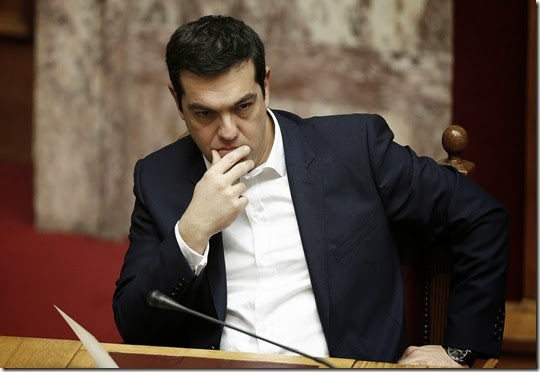Heiner Flassbeck says Germany is asserting a destructive agenda proven to be driving Europe into recession - February 21, 2015

Bio
Dr Heiner Flassbeck Graduated in April 1976 in economics from Saarland University, Germany, concentrating on money and credit, business cycle theory and general philosophy of science; obtained a Ph.D. in Economics from the Free University, Berlin, Germany in July 1987. 2005 he was appointed honorary professor at the University of Hamburg. Employment started at the German Council of Economic Experts, Wiesbaden between 1976 and 1980, followed by the Federal Ministry of Economics, Bonn until January 1986; chief macroeconomist in the German Institute for Economic Research (DIW) in Berlin between 1988 and 1998, and State Secretary (Vice Minister) from October 1998 to April 1999 at the Federal Ministry of Finance, Bonn, responsible for international affairs, the EU and IMF. Worked at UNCTAD since 2000; from 2003 to December 2012 he was Director of the Division on Globalisation and Development Strategies. He was the principal author of the team preparing UNCTAD's Trade and Development Report, with specialization in macroeconomics, exchange rate policies, and international finance. Since January 2013 he is Director of Flassbeck-Economics, a consultancy for global macroeconomic questions (www.flassbeck-economics.de). ). Co-authored ACT NOW! The Global Manifesto for Economic Policy published 2013 in Germany.
 PAUL JAY, SENIOR EDITOR, TRNN: Welcome to The Real News Network. I'm Paul Jay.
PAUL JAY, SENIOR EDITOR, TRNN: Welcome to The Real News Network. I'm Paul Jay. As we record this, talks between Greece and the Eurozone officials appear to be reaching some kind of agreement. There'll be some kind sort of extension on Greeks' death and the bailout agreement.
Now joining us to talk about this is Heiner Flassbeck, who joins us from Geneva.
Thanks for joining us, Heiner.
HEINER FLASSBECK, COAUTHOR, AGAINST THE TROIKA: CRISIS AND AUSTERITY IN THE EURO ZONE: Thanks for inviting me.
JAY: So, as everybody knows who watches The Real News, Heiner used to be the director of UNCTAD. He's the author of the book Against the Troika. And he's--also can be found, his writings and blog, at Heiner-Flassbeck.de.
Thanks for joining us.
So we don't know the details yet, and I guess the devil will be in the detail. But what so far do we know about this agreement, assuming there is one?
FLASSBECK: Well, what we know is that it seems there is the compromise between the Euro group on the one hand and the Greek government on the other hand, which means that in one way or the other they have agreed on extending the bailout and they have agreed on conditions. Unfortunately, we do not know about the conditions. This is the crucial point, because the Greek government said, we want new conditions, we want new conditionality for the bailout, because we cannot continue with the old neoliberal conditions that were imposed on them by the troika.
JAY: Give some examples of some of the more outstanding of these conditions.
FLASSBECK: Well, for example, there was privatization. They said, you have to collect 50 billion by privatizing the Port of Piraeus and another things. And this is absolutely unreasonable, because if an investor knows where these guys have to sell the thing, that the price goes down and you sell it for nothing. So this is one of the things.
The other thing's where to keep a primary surplus in the government budget, which means a surplus except for interest payments of 4.5 per cent, which is extremely high, so all these things should be relaxed. But the conditionality hasn't changed. Greek economy, the Greek economy is in a very bad shape. They have gone through a Great Depression. Unemployment is extremely high. Poverty is spreading. And so what the country, what the economy needs is stimulation, is positive effects from--coming from government investment and government consumption. And this is the only way out for the country to recover. And so far the SYRIZA government is absolutely right. It's just reasonable what they're asking for.
JAY: Now, there's--people call and the press here, they can't say SYRIZA in the newspapers here without saying radical, the radical left SYRIZA. But, in fact, in Greek politics there is a radical left left of SYRIZA, and they've been critical of SYRIZA, that they say there's already a kind of secret agreement, they're suggesting, to give in on the conditionality issues and so on. I mean, what do you know about this?
FLASSBECK: Well, it's absolutely clear that the situation for the SYRIZA government is extremely difficult. They're running out of money. First of all, they need a bailout. That's not too urgent. But the more urgent thing is that people are taking money from their bank accounts. The banks are in very bad shape. The banks need emergency liquidity assistance from the European Central Bank. And this is only given step by step, in very small steps, meanwhile, because there is no bailout. The ECB has not said it absolutely clear, but the ECB has hinted to the point that without a bailout the emergency liquidity system could run out. And then, as in Cyprus--we have seen it two years ago--the situation would deteriorate dramatically, because then the banks would be in danger of going bankrupt day by day, so to say.
JAY: If there's a straight extension with no change on conditionality, say, four months or six months, it seems to be what they're talking about, is that just a stalemate? Is it--the fact that the Greek government might agree to four, six months more of this conditionality, is that a setback for SYRIZA? I mean, how would you analyse this?
FLASSBECK: Yeah, that would be, clearly, a big setback for SYRIZA. They have promised not to accept the old conditionality. And so far they have defined a road somewhere in the middle where the SYRIZA that can keep their face and also the German government, and particularly on the northern governments, can say, well, we have still imposed conditions on them.
So I think in the end there will be a compromise. The rumours came from Paris and from Rome that the governments there were sympathetic with the SYRIZA approach. And I think once the Germans realized that they are rather isolated or they only have coalition friends, so to say, from Finland and the Baltics, then they will give in and they will say, well, then let's give them a little bit of money for a couple of months, and then, meanwhile, we're going to renegotiate again, and that we're imposing the old conditionality. That's very clear afterwards.
JAY: And I guess for SYRIZA they'll call it a victory of the other side agrees to even discuss conditionality.
FLASSBECK: Yeah, that would be a victory, definitely.
JAY: Now, apparently, something like a billion euros are leaving the Greek banks, and a lot of--real currency run. But SYRIZA says there's not going to be currency controls. Why don't they want controls? Cyprus eventually had to do it.
FLASSBECK: Well, I'm not quite clear about this. Obviously, they do not want to spread more panic. They want to give the impression that things are going rather normal. Money is flowing out, but at the moment the quantities seem to be controlled [incompr.] seem not to be dramatic. And so far this is a very dangerous, dangerous, right on the sword's edge, because at any time, any time, panic can come up and the people are rushing out. But capital controls would be clearly, so to say, the admittance that things go out of hand.
JAY: Now, Germany's position, they're projecting this kind of confidence that even if Greece was to leave the Eurozone, it wouldn't be such a disaster, they can live with it, and so on. I mean, is that a bargaining position? Or are they in fact actually more concerned about it than they appear?
FLASSBECK: Well, the first thing I think they're concerned about: their own members of Parliament, because they have to vote next week then about the bailout extension. And the conservative circles in Germany, there is really a lot of--well, you can call it hatred for Greece and all this [incompr.] And so if for them a left-wing what they call a radical left-wing government fails, well, it would be nice. They think it's a good thing to happen. But it could really spell chaos in Greece. It could lead to disaster. And it could lead to a totally uncontrollable situation insofar exit is easily said. But it's a very difficult process, a very complex process, and it can lead anytime, anytime into an avalanche of panic reactions with the people, and then into a real situation where you could talk of a failed state or on ungoverned state, which would be a disaster in the rest of Europe.
JAY: Alright. Thanks very much for joining us, Heiner.
FLASSBECK: Thank you.
JAY: And thank you for joining us on The Real News Network.

![The [Greek] European Tragedy](http://3.bp.blogspot.com/-OSMAuv1xvEY/UUpsO5__BaI/AAAAAAAABsg/DZGqo9w12Ek/s920/GkBack_new.jpg)



 Photo: Views of the Greece compromise differ, mostly depending on pre-existing views on the topic. (Reuters: Yannis Behrakis)
Photo: Views of the Greece compromise differ, mostly depending on pre-existing views on the topic. (Reuters: Yannis Behrakis) 







 Greece is trying to balance the demands of creditors with those of austerity-weary voters
Greece is trying to balance the demands of creditors with those of austerity-weary voters  Greek voters have experienced years of austerity
Greek voters have experienced years of austerity 
 Greek Finance Minister Yanis Varoufakis (right) will have to convince his German counterpart, Wolfgang Schaeuble, pictured here earlier this month in Berlin
Greek Finance Minister Yanis Varoufakis (right) will have to convince his German counterpart, Wolfgang Schaeuble, pictured here earlier this month in Berlin  The new Greek government, led by Prime Minister Tsipras, was elected by promising to reverse austerity
The new Greek government, led by Prime Minister Tsipras, was elected by promising to reverse austerity 












 PAUL JAY, SENIOR EDITOR, TRNN: Welcome to The Real News Network. I'm Paul Jay.
PAUL JAY, SENIOR EDITOR, TRNN: Welcome to The Real News Network. I'm Paul Jay. 